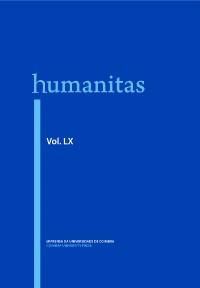Please use this identifier to cite or link to this item:
https://hdl.handle.net/10316.2/27939| DC Field | Value | Language |
|---|---|---|
| dc.contributor.author | Dias, Paula Barata | - |
| dc.date.accessioned | 2014-01-21T17:11:21Z | |
| dc.date.accessioned | 2020-10-02T17:02:18Z | - |
| dc.date.available | 2014-01-21T17:11:21Z | |
| dc.date.available | 2020-10-02T17:02:18Z | - |
| dc.date.issued | 2008 | - |
| dc.identifier.issn | 2183-1718 | - |
| dc.identifier.uri | https://hdl.handle.net/10316.2/27939 | - |
| dc.description.abstract | A literatura cristã, particularmente a monástica, sobrevaloriza a limitação dos alimentos como método ascético, e divulgou como positivas algumas estratégias de privação alimentar enquanto fonte de virtude. Esta perspectiva coincide, em larga medida, com o votar dos alimentos à sua condição utilitária, com a depreciação a que geralmente se votam as percepções com origem no gosto, ou com que se considera menor a arte ou a apreciação estética dos alimentos. No entanto, os textos bíblicos estão repletos de referências à alimentação, não só como realidade incontornável do destino da humanidade, mas também como fonte de significado espiritual e místico. Este artigo visa ilustrar a riqueza das referências alimentares contidas na Bíblia, explorar os seus significados e, sobretudo, mostrar como o condicionamento alimentar, não necessariamente pelo vector da privação e da renúncia, faz parte da linguagem espiritual do cristianismo. | por |
| dc.description.abstract | The purpose of this article is to redress an imbalance regarding the way Christian literature deals with the subject of food.There are many references to the importance of fasting or dieting in relation to the ascetic way of life and how this is a virtue. This view coincides, largely, with a widespread contemporary scorn for those who have an aesthetic appreciation of food. However, this is a rather one-sided viewpoint as the Bible is also rich in more positive references on the same subject and how it is a source of spiritual and mystical significance. The article explores their meanings and how, not only the denial and renunciation of food is an essential constituent to the spiritual language of Christianity, but also its abundance and indulgence. | eng |
| dc.language.iso | por | - |
| dc.publisher | Faculdade de Letras da Universidade de Coimbra, Instituto de Estudos Clássicos | - |
| dc.subject | Food | eng |
| dc.subject | Bread | eng |
| dc.subject | Nourishment | eng |
| dc.subject | Famine | eng |
| dc.subject | Abundance | eng |
| dc.subject | Bible | eng |
| dc.subject | Christian literature | eng |
| dc.subject | Comida | por |
| dc.subject | Pão | por |
| dc.subject | Alimentos | por |
| dc.subject | Fome | por |
| dc.subject | Saciedade | por |
| dc.subject | Abundância | por |
| dc.subject | Bíblia | por |
| dc.subject | Literatura cristã | por |
| dc.title | A linguagem dos alimentos nos textos bíblicos sentidos para a fome e para a abundância | por |
| dc.type | article | - |
| uc.publication.collection | Humanitas vol. 60 | - |
| uc.publication.firstPage | 157 | - |
| uc.publication.lastPage | 175 | - |
| uc.publication.location | Coimbra | - |
| uc.publication.journalTitle | Humanitas | - |
| uc.publication.volume | 60 | por |
| dc.identifier.doi | 10.14195/2183-1718_60_11 | - |
| uc.publication.section | Artigos | - |
| uc.publication.orderno | 11 | - |
| uc.publication.area | Artes e Humanidades | - |
| uc.publication.manifest | https://dl.uc.pt/json/iiif/10316.2/27939/257307/manifest?manifest=/json/iiif/10316.2/27939/257307/manifest | - |
| uc.publication.thumbnail | https://dl.uc.pt/retrieve/11999465 | - |
| item.grantfulltext | open | - |
| item.fulltext | With Fulltext | - |
| Appears in Collections: | HVMANITAS | |
Files in This Item:
| File | Description | Size | Format | |
|---|---|---|---|---|
| humanitas60_artigo11.pdf | 8.35 MB | Adobe PDF |  |
Items in DSpace are protected by copyright, with all rights reserved, unless otherwise indicated.
